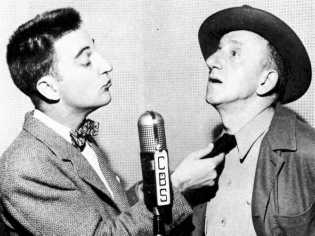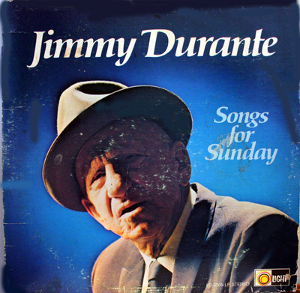Related Research Articles

James Francis Durante was an American comedian, actor, singer, and pianist. His distinctive gravelly speech, Lower East Side accent, comic language-butchery, jazz-influenced songs, and prominent nose helped make him one of the United States' most familiar and popular personalities of the 1920s through the 1970s. He often referred to his nose as the schnozzola, and the word became his nickname.
"Delicado" is a popular song published in 1952 with music by Waldir Azevedo and lyrics by Jack Lawrence. The song reached the top of the Billboard charts in 1952.
Sonny King was an American lounge singer of Italian descent.

Palooka is a 1934 American pre-Code comedy film directed by Benjamin Stoloff and starring Stuart Erwin in the title role, Lupe Velez and Jimmy Durante, and based on the comic strip by Ham Fisher. The film was adapted by Jack Jevne, Arthur Kober, Gertrude Purcell, Murray Roth and Ben Ryan from the comic strip. The film is also known as The Great Schnozzle in the United Kingdom.
Pat Friday was an American singer who worked with Glenn Miller on his films in the early 1940s.

Yestergroovin' is the thirty-ninth studio album by guitarist Chet Atkins, released in 1970. Yestergroovin' was nominated for the 1970 Grammy Award for Best Country Instrumental Performance. It did not win, but Atkins's collaboration with Jerry Reed Me and Jerry did. He would be nominated twice in the same category again in 1973.

Two Girls and a Sailor is a 1944 American musical film directed by Richard Thorpe and starring Van Johnson, June Allyson and Gloria DeHaven. Set on the American homefront during World War II, it's about two singing sisters who create a lavish canteen to entertain members of the military, thanks to financial contributions from a mysterious donor. The picture features a host of celebrity performances, including Jimmy Durante doing his hallmark "Inka Dinka Doo", Gracie Allen, and Lena Horne. Richard Connell and Gladys Lehman were nominated for the Academy Award for Best Original Screenplay.
Bennett A. "Ben" Ryan was an American songwriter who wrote the music and lyrics to the popular song "(The Gang that Sang) Heart of My Heart". He also wrote or co-wrote many other popular songs including "Inka Dinka Doo", "M-I-S-S-I-S-S-I-P-P-I", "No Nothing", "The Thrill of a New Romance", "When Frances Dances with Me", and "When I Send You a Picture of Berlin"
Carnival is a 1935 American comedy film directed by Walter Lang and starring Jimmy Durante and Sally Eilers.
Lou Clayton was an American song-and-dance vaudeville performer, best known for his teaming with Jimmy Durante and Eddie Jackson, as Clayton, Jackson, and Durante, or "The Three Sawdust Bums".

Edward Jackson was a leading vaudeville performer, actor and musician, and longtime colleague and partner of Jimmy Durante. He appeared in vaudeville with Durante and Lou Clayton as the team Clayton, Jackson & Durante, known as the "Three Sawdust Bums."
Four Star Revue is an American variety/comedy program that aired on NBC from October 4, 1950, to December 26, 1953.

The Durante-Moore Show was an old-time radio show that ran on NBC with episodes running from March 25, 1943–October 28, 1943 and on CBS with episodes running from October 8, 1943–June 27, 1947.
Phillip W. Cohan was an American producer and director.
The Jumbo Fire Chief Program is an American old-time radio program starring Jimmy Durante, Donald Novis and Gloria Grafton. The series originated from WEAF radio in New York and was broadcast nationally over the Red Network of the National Broadcasting Company. The series was based on Billy Rose's musical circus act Jumbo which premiered on Broadway in November 1935 and a continuation of sponsor Texaco's The Fire Chief, a radio program starring Ed Wynn that ended its three-year run several months before Jumbo' s premiere. The program starred Jimmy Durante as Claudius "Brainy" Bowers, the overzealous circus promoter of the Consodine circus act who usually gets the show in financial crisis due to his over exaggeration of the show's profits, and Donald Novis and Gloria Grafton as young love interests Matt Mulligan, Jr. and Mickey Consodine. Mickey is the daughter of unheard character John Consodine, the owner of the circus act.
Black Strap Molasses is a novelty song by Carmine Ennis and Marilou Harrington, released in August 1951. It was recorded by the movie stars Groucho Marx, Jimmy Durante, Jane Wyman, and Danny Kaye, with chorus and orchestra directed by Sonny Burke. The song was a popular success, reaching number 29 on the Billboard charts, but was banned from some radio networks because it was perceived as promoting commercial products.

Jackie Barnett PresentsHello Young Lovers is a 1965 album by Jimmy Durante, with arrangements by Roy Bargy. Hello Young Lovers' was the last recording that Durante and Bargy would make together; Bargy had served as Durante's musical director since 1943.

Jackie Barnett PresentsOne of Those Songs is a 1966 album by Jimmy Durante, with arrangements by Ernie Freeman. The cover depicts Durante embracing CeCe, his adopted daughter with his second wife, Margie. The song "Margie" is dedicated to his wife.

Jackie Barnett PresentsSongs for Sunday is a 1967 album by Jimmy Durante, with arrangements by Ralph Carmichael. David Bakish, in his 1995 book on Durante, described the music on the album as "truly from the heart". Durante later performed "Peace in the Valley" and "One of These Days" at the Oral Roberts summer festival in June 1971.

September Song is a 1963 album by Jimmy Durante, with arrangements by Roy Bargy.
References
- ↑ "Soundtracks for Palooka". IMDB. Retrieved February 16, 2012.
- ↑ "Record Reviews". Billboard. April 29, 1950. Retrieved February 16, 2018.
- ↑ "Track Search: Inka Dinka Doo | AllMusic". AllMusic . Archived from the original on 2011-08-08. Retrieved 2012-05-10.